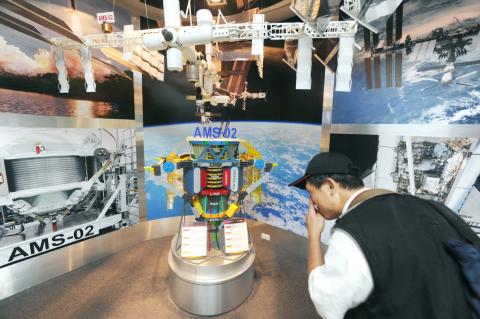The establishment of a Taiwan-based ground control center for an advanced particle physics detector in space is a win-win development, President Ma Ying-jeou (馬英九) said yesterday at the formal opening of the facility. A new generation of researchers can be trained, while Taiwanese scientists continue to contribute to the Alpha Magnetic Spectrometer-02 (AMS-02) project that is key to the future of the human race, Ma said.
The Payload Operations Control Center located in Taiwan, one of only two in the world, began operations on Sunday to help monitor the particle physics detector in space. The device is designed to detect charged particles in cosmic rays to find anti-matter and dark matter in the hope of answering questions about the “big bang” and the formation of the universe.
The military-run Chung-shan Institute of Science and Technology in Taoyuan County, where the center is located, has sent six experts to the US and Switzerland for training, while the Ministry of National Defense has also trained a batch of servicemen to participate in the program, the president said. In the future, other young scientists who are interested in the field would be recruited to the project, Ma said.

Photo: AFP
The AMS project, headquartered at the European Organization for Nuclear Research in Geneva, cost about US$100 billion. Ma said no single country can afford to shoulder that kind of price tag, but the research could become the basis for many fields of applied sciences in a few decades.
“It’s not being done for immediate benefit, but for future generations,” Ma said.
In order for the human race to advance, these types of scientific achievements must be passed on to coming generations, he said.
The AMS-02 project was launched by the US Department of Energy in 1999 in collaboration with 15 other countries, including Taiwan. It is scheduled to run for 15 years.

ANOTHER EMERGES: The CWA yesterday said this year’s fourth storm of the typhoon season had formed in the South China Sea, but was not expected to affect Taiwan Tropical Storm Gaemi has intensified slightly as it heads toward Taiwan, where it is expected to affect the country in the coming days, the Central Weather Administration (CWA) said yesterday. As of 8am yesterday, the 120km-radius storm was 800km southeast of Oluanpi (鵝鑾鼻), Taiwan’s southernmost tip, moving at 9kph northwest, the agency said. A sea warning for Gaemi could be issued tonight at the earliest, it said, adding that the storm is projected to be closest to Taiwan on Wednesday or Thursday. Gaemi’s potential effect on Taiwan remains unclear, as that would depend on its direction, radius and intensity, forecasters said. Former Weather Forecast

As COVID-19 cases in Japan have been increasing for 10 consecutive weeks, people should get vaccinated before visiting the nation, the Centers for Disease Control (CDC) said. The centers reported 773 hospitalizations and 124 deaths related to COVID-19 in Taiwan last week. CDC Epidemic Intelligence Center Director Guo Hung-wei (郭宏偉) on Tuesday said the number of weekly COVID-19 cases reported in Japan has been increasing since mid-May and surpassed 55,000 cases from July 8 to July 14. The average number of COVID-19 patients at Japan’s healthcare facilities that week was also 1.39 times that of the week before and KP.3 is the dominant

The Chinese Communist Party’s (CCP) working group for Taiwan-related policies is likely to be upgraded to a committee-level body, a report commissioned by the Mainland Affairs Council (MAC) said. As Chinese President Xi Jinping (習近平) is increasingly likely to upgrade the CCP’s Central Leading Group for Taiwan Affairs, Taiwanese authorities should prepare by researching Xi and the CCP, the report said. At the third plenary session of the 20th Central Committee of the CCP, which ended on Thursday last week, the party set a target of 2029 for the completion of some tasks, meaning that Xi is likely preparing to

US-CHINA TRADE DISPUTE: Despite Beijing’s offer of preferential treatment, the lure of China has dimmed as Taiwanese and international investors move out Japan and the US have become the favored destinations for Taiwanese graduates as China’s attraction has waned over the years, the Ministry of Labor said. According to the ministry’s latest income and employment advisory published this month, 3,215 Taiwanese university graduates from the class of 2020 went to Japan, surpassing for the first time the 2,881 graduates who went to China. A total of 2,300 graduates from the class of 2021 went to the US, compared with the 2,262 who went to China, the document showed. The trend continued for the class of 2023, of whom 1,460 went to Japan, 1,334 went to